By alphacardprocess May 29, 2025
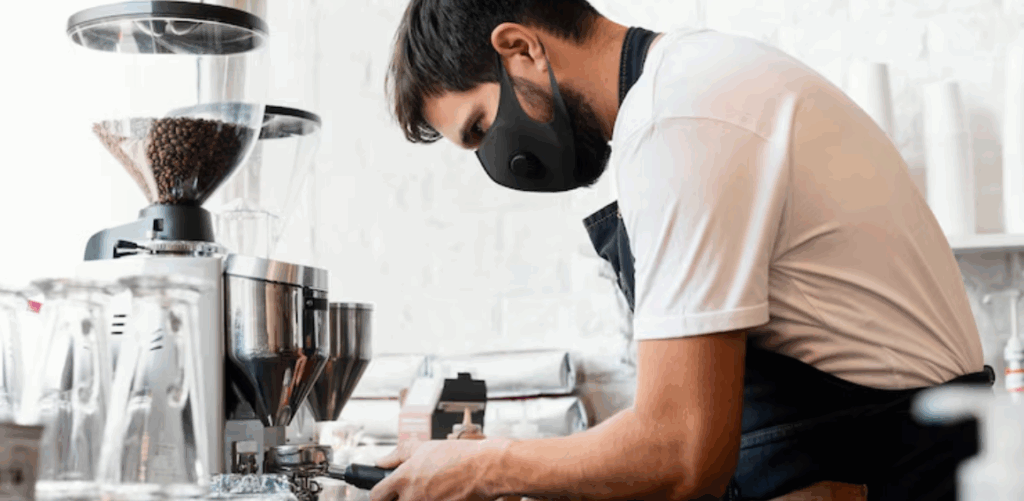
Do you plan for starting a coffee shop? You’re not alone. Independent coffee shops are growing these days and are meeting the cravings for authentic brews, cozy spaces and community vibes. But every great cup of coffee is the result of a well-outfitted barista station. The reality? Passion won’t take your business without the right tools to deliver consistency, speed and customer satisfaction.
Whether you’re starting a quaint neighborhood café or a bustling espresso bar, the tools you select will shape the way you work. Everything on your list should have a function—improving efficiency, increasing quality, or making it possible to serve more customers with less work.
Here, we breakdown the twelve indispensable tools for staring a coffee shop. From espresso machines to grinders, brewers to choosing the right payment merchant providers to help you make investments that pay off in the long term. Let us get started.
12 Must Have Tools When Starting A Coffee Shop
1. Commercial Espresso Machine
If you’re launching a coffee shop, you’ll need to invest in a commercial espresso machine. It’s the soul of your entire setup, running the powering everything from espresso shots to lattes, cappuccinos and Americanos. It is this one machine that affects the quality, speed and consistency of every coffee product you serve.
Customers want their coffee fast — but they don’t want to sacrifice flavor. Good quality espresso machine will ensure that delicious, rich coffee shot and good looking crema every time. More importantly, it allows you to serve a variety of drinks in quick succession without altering the flavor.
That speed becomes more important right around rush hour in the morning. A machine that takes a long time to warm up or can’t keep up with high volume will lead to lasting backups, and render your staff and customers slow and angry.
When opening a coffee shop, choose a semi-automatic or automatic machine with some of the following features:
- Dual or triple boilers for multitasking
- PID temperature control for consistency
- Pre-infusion capabilities for smoother shots
- A built-in steam wand with adjustable pressure
2. Coffee Grinder
You’ll also need a decent coffee grinder to go with your great espresso machine. If you are starting a coffee shop, the grinder is what is going to provide your espresso flavor and aroma. How fresh and how even a grind you are using will be reflected in the beverage.
Blade grinders are inexpensive but chop coffee inconsistently, which can lead to an uneven extraction and bitter flavors. Burr grinders, in particular flat or conical burr models, produce ground particles of a uniform size: a necessary condition for brewing a consistent cup of coffee.
Consistency, when it comes to grind, is key with espresso. Unevenly processed grounds will lead to poor extraction and a bad shot. A burr grinder, with consistent settings, allows for particle-size tuning for each of the brew methods — espresso, pour-over, French press.
“You grind on demand” to get the freshest shot possible. A strong grinder means you”re less likely to experience clogs, breakage, and maintenance issues for years to come.
3. Commercial Coffee Brewer
Some customers do not want espresso. Some people just want a rich, smooth cup of drip coffee, and that’s what a commercial coffee brewer will get them. This is particularly the case when catering to you need to cater to both casual coffee drinkers and connoisseurs. A good brewer means you don’t have to ever be caught off guard during a chaotic morning.
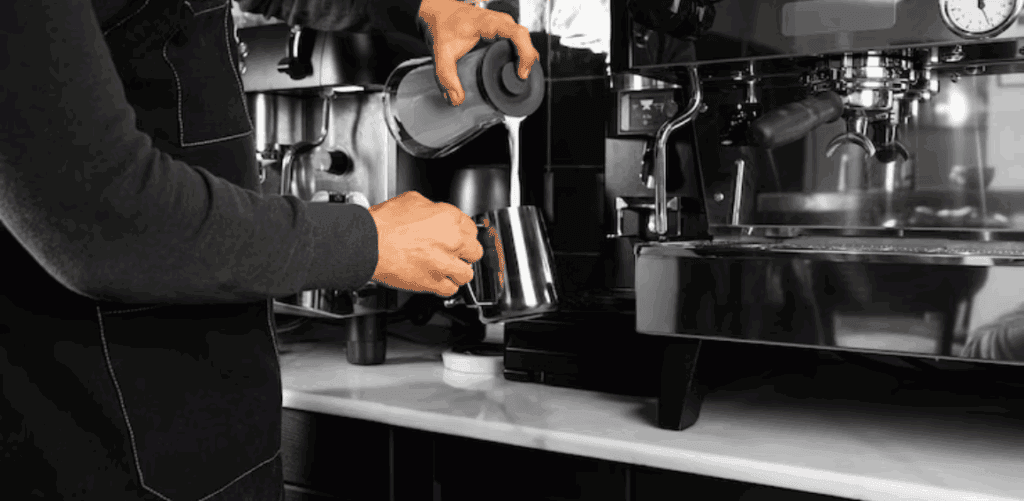
Drip coffee is a menu mainstay at any cafe. It’s quicker to serve, affordable, and highly customizable with different roasts. . A good brewer lets you to keep a steady supply on hand for refills and wholesale orders, whether for office commuters or takeout clients.
Look for:
- Batch-brewing function
- Programmable temperature and volume settings
- Dedicates hot water dispenser for teas or Americanos
- Thermal carafes to keep coffee warm
- Look for ones that are easy to clean, have auto rinse cycles, and are brewing standards certified.
When you open a cafe, serving both espresso and drip coffee widen your audience, and helps keep things moving briskly, even when things get busy.
4. Reliable Payment Processor
When you’re starting a coffee shop, your payment system should be as important as your espresso machine. The importance of a good payment processor lies in the ability to provide fast and easy transactions, gain trust and maintain the steady flow of income. In today’s cashless world, you can’t afford to lag behind.
Now the main question you might have, why fast payment processing is important. Imagine a busy morning rush. There’s a queue of caffeine-deprived customers waiting for their morning coffee.
If your system for accepting payments lags or freezes or fails, it means not just slowing the pace of taking orders, but also gets on the nerves of your customers. The faster and more secure the payment processing, the less downtime and the more customers served.
Security is equally critical. When you’re opening a coffee shop, you have sensitive customer data from day one. By leveraging a secure payment processor that offers encryption, tokenization and fraud protection, you can keep yourself and your customers safe from cyberthreats.
When choosing a system, prioritize features like:
- Contactless payments for speed and hygiene
- NFC compatibility (for mobile wallets like Apple Pay or Google Pay)
- QR code payments for flexible checkout
- Digital receipts for added transparency
These are not only efficiency improvement tools -but -customer experience uplifters. Contactless payments are rising among customers, especially in the post-COVID world.
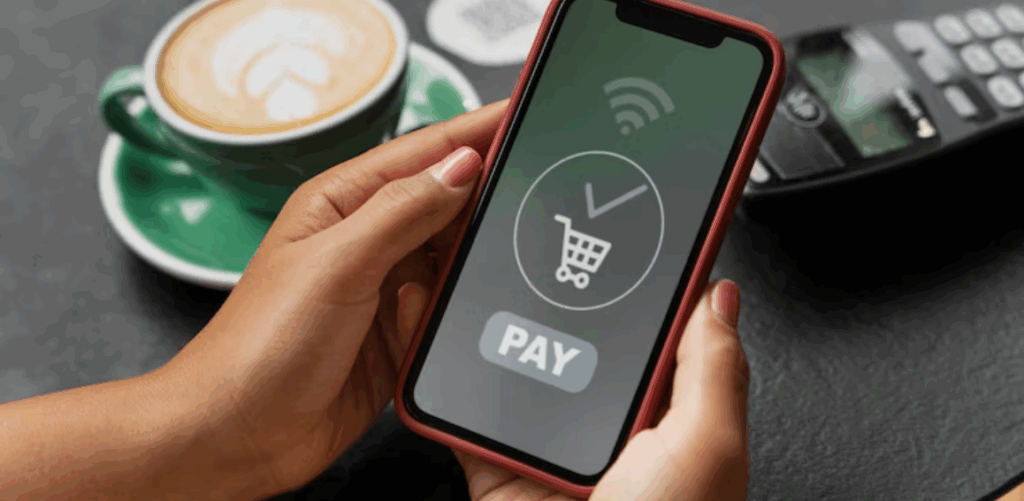
Square, Clover, and Toast are some popular processors and each offer specialized programs for small food and beverage companies. Square is easy to use and perfect for a pop-up or mobile operation. Clover is making way for open hardware choices and easy customization. Toast is made for cafes and restaurants, offering menu integrations and real-time analytics. Hence, when you are planning of starting a coffee shop, it matters to have the right payment processors to process payments.
As a new or small cafe, you must also understand the real cost of payment gateways as that have a direct impact on your bottom line.
5. POS System with Inventory Management
If you are starting a coffee shop, a strong POS system that offers inventory management is necessary. In addition to processing transactions, it is your operations hub — keeping tabs on sales, supplies and employee performance.
Today’s POS systems are not just payment processors. They generate real-time reports, track best-selling menu items, and even monitor employee shifts and productivity. This helps you identify which drinks are moving and who’s performing best behind the counter.
Stock is one of the most difficult things you’ll deal with during phase one of opening up a coffee shop. With inventory management, your POS will notify you if the outlet is running low on coffee beans, syrups or milk. Some systems make it possible for you to set automatic reorders with suppliers and you will not have to worry about being out of a product in the middle of your peak.
You can also find POS software that integrates with loyalty schemes and offer email marketing. With services like Square, Toast or Clover, you can build digital rewards that attract repeat customers.
Selecting the right POS system will not only save you time and money, it’ll also lay the groundwork for future business growth.
6. Refrigerator & Freezer
Refrigeration is important when you’re starting a coffee shop. Keeping milk and creamers, pastries and perishable syrups cool is a necessity for freshness and safety.
You’ll need cold storage for:
- Dairy and plant-based milks
- Pastries and sandwich fillings
- Fresh fruits for smoothies
- Whipped cream and garnishes
And if you’re planning to sell cold brews or other bottled beverages, space is even more critical.
Space is tight in most cafes. So under-counter refrigerators and freezers, which tuck easily beneath prep stations or espresso bars. These pieces of equipment keep materials near without taking up valuable floor space.
Consider an ENERGY STAR–rated model to help save money on your utility bills. With steady refrigeration you maintain compliance with food safety guidelines, ensure fresh ingredients and maintain a smooth running operation.
7. Blenders and Mixers
When you are starting a coffee shop, offering just coffee might limit your revenue. Customer favorites include smoothies, frappés, matcha lattes and cold brews, and every one of them calls for a blender or a mixer.
Customers want variety and cold beverages are big sellers, particularly in summer. A high-powered blender allows you to make:
- Iced coffee frappés
- Fruit smoothies
- Protein shakes
- Milkshakes or blended teas
If you provide baked goods, you’ll also want a commercial mixer to whip up doughs or batters for in-house items.
Opt for professional-grade blenders with:
- High-speed motors (2+ HP)
- Hushered with a sound enclosure for quiet blending
- Dishwasher safe pitchers for easy clean up
Spending money on strong blenders and mixers will ensure that all of your drinks taste and feel the same — plus open up your menu to high-margin items that end up increasing your overall revenue.
8. Display Case for Pastries and Snacks
A well-positioned display case isn’t just functional — it’s a sales enhancer. If you’re starting a coffee shop and you haven’t thought about the power of visual merchandising, do it.
Fresh pastries, muffins, and grab-and-go snacks visually entice customers as they wait. A strategically lit display can lead to more add-on purchases and increase the average ticket size.
Your display case type depends on what you’re having to serve. Dry cases are fine for baked goods — cookies, croissants. Refrigerated ones are essential for cheesecakes, yogurts, or cream-filled pastries. Many cafés use a combination to keep items fresh and appealing.
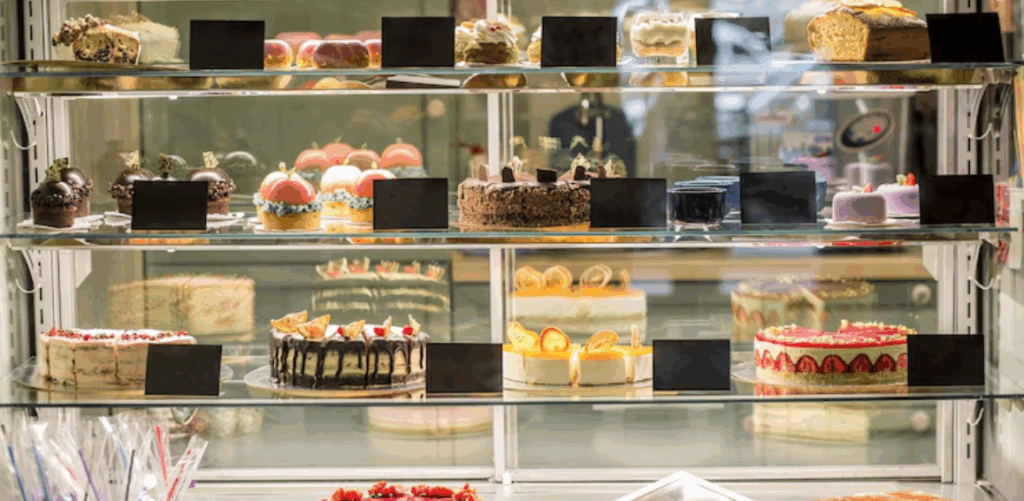
Choose modern clean lines and glass panels for an unobstructed view. Search for models which have LED lighting, adjustable shelves, and, for certain products, temperature control.
A good quality display case will transform your offering into tempting must-haves — and fatten your bottom line.
9. Water Filtration System
If you’re starting a coffee shop this addition is a game changer! Coffee is 98% water—quality counts. When baristas brew coffee, its quality directly affects flavor and machine lifespan.
Unfiltered tap water often contains minerals, chlorine, and impurities that dull flavor. A filtration system ensures consistency in your coffee and tea, giving your drinks a clean, crisp taste that customers will notice.
Hard water can cause scale buildup in espresso machines and brewers, reducing efficiency and causing damage over time. Filtration systems remove minerals and extend your machine’s lifespan, saving money on repairs and replacements.
Although the initial cost may seem high, filters are low maintenance and easy to replace.
Clean water makes for better coffee and less gear upkeep crucial ingredients for long-term success.
10. Storage Containers & Organizational Tools
When you’re starting a coffee shop, efficiency and cleanliness go hand in hand. That’s where proper storage and organization play a huge role.
Store coffee beans, loose tea leaves, sugar, and dry goods in airtight containers. They seal in freshness and guard against humidity or pests. Stackable designs save you space and don’t clutter your counters.
Be sure to mark all bins with the date of expiration and product name. This simplifies preparation and reduces errors. Clear bins and scoops also expedite things during rush hours.
If you do have the space, invest in an ergonomic shelving unit that’s easy to get to and heavy duty. Instead, adjustable wire racks, under-counter organizers and wall-mounted shelves can help a small space look and work better.
Being organized is what keeps things running smooth when it gets busy, and that means your café will run more efficiently than ever!
11. Cleaning Supplies and Sanitization Tools
If you’re in the market of starting a coffee shop, cleanliness is something to take seriously and have no room for error. So not only does having it protect your brand, it prevents you from violating local health codes.
Stock up on:
- Food-safe disinfectants
- Sanitizing wipes and sprays
- Degreasers for kitchen walls
- Buckets with mopheads and wipes
Also, create cleaning checklists: daily (wipe counters), weekly (clean fridge coils), monthly (sanitize drains).
Opt for machines that have automatic cleaning cycles built in, since cleaning is a big part of the maintenance you need to do. Always descale and backflush to prevent buildup and flavor contamination.
Educate staff about food safety, hand-washing and contamination prevention. Record-keeping acknowledges cleaning routines.
Clean tools and environments create customer confidence and save you from expensive violations. A tidy café is a welcoming café.
12. Comfortable Seating & Ambiance Equipment
The feel of your cafe is as important as your menu. At a time when the YouTube headquarters lunatic is gleaming with arrogance, Starbucks, which has kept us all awake for years, should know how key it is when opening a coffee shop to establish the right atmosphere.
Select seating based on your layout. Use a mix of couches, bar stools, and café chairs. Choose options that are easy to clean and durable. Small tables for solo guests and bigger ones for groups help cater to everyone.
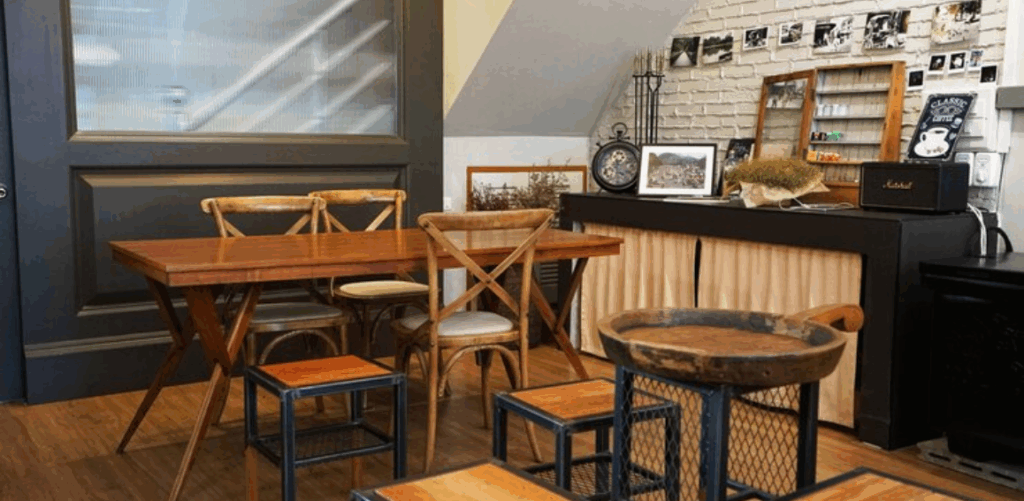
Warm, soft lighting encourages guests to linger. Combine pendant lights, Edison bulbs, and natural light for a cozy feel. Wall art, indoor plants, and neutral tones enhance visual comfort.
Today’s guests want Wi-Fi, charging ports, and background music. Use ambient playlists to match your brand’s mood. Creating the right atmosphere increases dwell time and loyalty, translating into higher daily sales.
Don’t go cheap on high-use items like espresso machines or grinders. A quality investment reduces downtime and maintenance costs in the long run.
Conclusion
Launching your dream café? These 12 must-have tools are your foundation. From espresso machines and POS systems to seating and ambiance, the right equipment ensures smooth operations, satisfied customers, and strong daily sales.
Starting a coffee shop is a major leap but with the right setup, you’ll be ready to stand out and succeed in a competitive market. Ready to open your dream café? Start with the right tools and let your coffee do the talking.
Frequently Asked Questions
1. What are the essential tools I need to start a coffee shop?
To start a coffee shop, you need a commercial espresso machine, coffee grinder, reliable payment processor, POS system, refrigerator, blenders, and cleaning tools, among others.
2. Why is a reliable payment processor important for a coffee shop?
A reliable payment processor ensures quick, secure, and contactless transactions, improving customer satisfaction and reducing wait times during peak hours.
3. How much should I budget for basic coffee shop equipment?
Basic equipment can cost anywhere from $10,000 to $30,000 depending on quality, brand, and whether you buy new or used tools.
4. Can I use a regular kitchen grinder in my coffee shop?
No, regular grinders aren’t built for high volume. Invest in a commercial burr grinder for consistency and durability.
5. Do I need a POS system even if I’m just starting out?
Yes. A POS system for coffee shops helps track sales, manage inventory, and improves overall efficiency, even for small-scale operations.